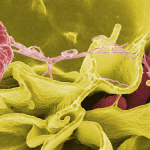
People living together often share many things. One of them turns out to be bacteria, as one of the biggest ever studies into bacterial transfer reveals how your co-habitants can affect your health.
Plates, toothpaste and the couch – if not the remote control: it is no secret that people share more than space when they live together in the same home.
But a recent study by Italy’s University of Trento indicates that you may be sharing more than you think.
In the study, published in Nature, scientists combined the results of 31 previous studies of people living under the same roof, which included results from 20 different nations. One of the questions the scientists wanted to answer was how the microscopic organisms and bacteria in our mouths and intestines get transferred from one person to another – across generations and between people who live close together.
They analysed no fewer than 10,000 samples of saliva and faeces from different nations in Europe, North and South America, Africa, and Asia. All bacterial strains from the samples were genetically sequenced, and the scientists were able to see whether the original owners of the samples were related, partners, cohabitants, or friends.
The study is one of the biggest ever made of how the small, bacterial inhabitants move between our bodies, and the results confirm that the first exchange of intestinal bacteria takes place before we are born, and that the transfer is so fundamental and prolonged that bacteria from a mother’s intestines can still be found in elderly people.
One of the more sensational results was that across all studies, those who shared a house also shared some 12% of the bacterial strains that exist in their intestines and no fewer than 32% of the bacterial strains that exist in the mouth. By comparison, people within the same population who were not cohabitants would expect to have only 3% of their mouth bacteria in common, so this figure for mouth bacteria was increased by a factor of 10 by sharing with others.
The results demonstrate how normal it is for the transfer of bacteria to other people, even without direct intimate contact such as kissing or sex.
The scientists believe that this transfer of bacteria can have a significant effect on our general health – and not necessarily in a bad way.
“Diversity is positive for our microbiomes,” the study’s first author Mireia Valles Colomer, from the University of Trento, explains to Science Illustrated. “We do not think that we need to find ways to prevent transmission. Social contact can be a source of beneficial impacts on our microbiome.”






